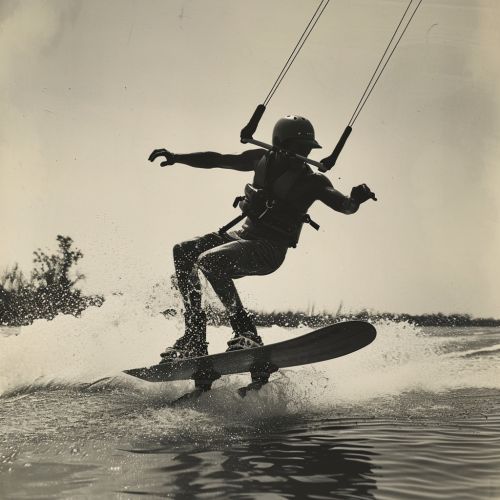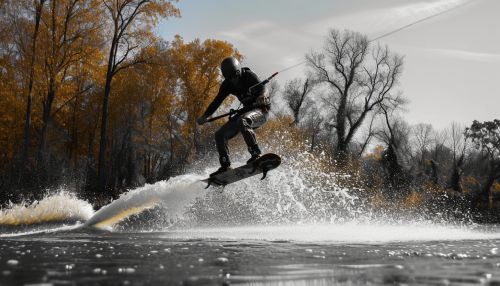Wakeboarding
History
Wakeboarding is a surface water sport which involves riding a wakeboard over the surface of a body of water. The sport was developed from a combination of water skiing, snowboarding, and surfing techniques. The rider is usually towed behind a motorboat, typically at speeds of 30–40 km/h (18-25 mph), depending on the board size, rider's weight, type of tricks, and rider's comfort. This speed could also be adjusted to suit the rider's personal preferences.


The sport of wakeboarding was originally called "skurfing" and was started in Australia and New Zealand by surfers Tony Finn and Howard Jacobs in 1985. They developed skurfboards, which were single-tip boards, with foot straps that were made from old windsurfing straps. The first mass-produced wakeboard was the Hyperlite 'Pro Model' designed by Herb O'Brien and pro wakeboarder Tony Finn.
Equipment
The essential equipment required for wakeboarding includes the wakeboard, life vest, and a towing boat. The wakeboard is a small, mostly rectangular, thin board with very little displacement and shoe-like bindings mounted to it. It was developed from a combination of water skiing, snowboarding, and surfing equipment.
The wakeboard construction typically includes a core, sidewalls, and a base. The core is made from foam or honeycomb mixed with resin and coated with fiberglass. Metal screws are inserted to attach bindings and fins. The base of the wakeboard is either smooth or fitted with channels or fins, or both.
Techniques
There are two main types of riding on a wakeboard, one is the "dominant" riding, and the other is the "switch" riding. Dominant riding is a natural stance with the left foot forward (regular), or the right foot forward (goofy). Switch riding is riding in the opposite stance of your natural position.
There are also many tricks that can be performed while wakeboarding. Some of these tricks include the "Air Raley" (the rider extends both legs behind them while airborne), "Tantrum" (a backflip performed by digging the heelside edge of the board into the water), and "Whirlybird" (a tantrum with an overhead 360-degree spin).
Competitions
Wakeboarding competitions are organized around the world by the International Waterski and Wakeboard Federation (IWWF). The IWWF is recognized by the International Olympic Committee as an official partner. The sport is divided into several categories including Pro Men, Pro Women, Junior Men, Junior Women, Masters Men, Masters Women, Veteran Men, and Veteran Women.
Competitions are judged based on the execution of tricks, intensity of the run, composition of the tricks, and the variety of tricks. The rider with the highest score at the end of the competition is declared the winner.
Safety
Wakeboarding, like any other water sport, has its risks. The most common injuries in wakeboarding include concussions, sprains, strains, and fractures. It is always recommended to wear a life vest while wakeboarding for safety.
